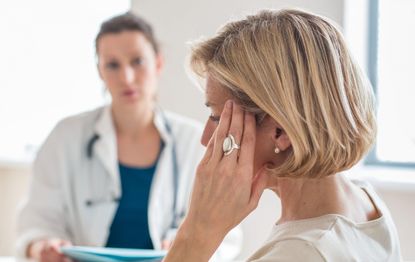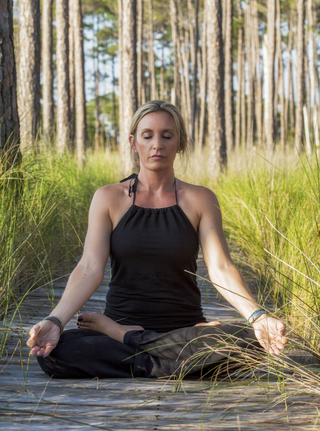How to combatdepression and anxiety andwhen you’re menopausal

They’re two of the least visible symptoms as well as two of the least talked about, but almost a quarter of women will experience symptoms of anxiety or depression around the time of the menopause. So while you might feel like you’re alone, you’re definitely not.
And when you know what you’re up against, tackling it will start to feel a whole lot easier, we promise.
What is the difference between anxiety and depression?
Anxiety is characterised by feelings of tension and worry that are difficult to control. People with anxiety tend to be constantly irritable or ‘on edge’ and worry excessively about normal, everyday things.
Depression is characterised by low mood and losing interest in pleasurable activities.
Although depression and anxiety might seem to be at opposite ends of the mood spectrum, some of the symptoms overlap and it’s common to have symptoms of both at the same time. 85% of people with depression also experience anxiety.

Symptoms of depression and anxiety
The core symptoms of depression are low mood, sadness and a loss of enjoyment in most activities for at least two weeks.
Other symptoms of depression include:
Sign up for the woman&home newsletter
Sign up to our free daily email for the latest royal and entertainment news, interesting opinion, expert advice on styling and beauty trends, and no-nonsense guides to the health and wellness questions you want answered.
- feelings of guilt
- feelings of helplessness
- feelings of worthlessness, low self-esteem or low confidence
- suicidal thoughts or thoughts about death
- loss of motivation
- lack of energy
- changes in appetite
- loss of sex drive
- sleep disturbances
- unexplained aches and pains
The core symptoms of anxiety are excessive anxiety and worry on most days for at least six months.
Other symptoms of anxiety include
- feeling restless or ‘on edge’
- irritability
- muscle tension or aches
- headaches
- sweating
- dizziness
- fast heartbeat and shortness of breath
- fatigue
- difficulty concentrating
- sleep disturbances
The menopause and anxiety
23% of women experience mood changes around the time of the menopause, and symptoms of anxiety like tension, worry, nervousness and panic become more common as the menopause approaches.
Can the menopause cause anxiety?
Women who have never had mental health issues before can experience symptoms of anxiety for the first time around the time of the menopause, while women with a history of anxiety may find that their symptoms get worse.
This is probably because oestrogen plays an important role in managing your brain’s activity. When your oestrogen levels drop, it can affect how your brain works and cause symptoms of anxiety like poor concentration, irritability, mood swings and panic attacks.
You might be more likely to get symptoms of anxiety during the menopause if you have a history of PMS, because your body may be more sensitive to hormonal fluctuations.
The menopause and depression
Research suggests that your risk of depression increases as you approach menopause. Feelings of low self-esteem, low energy and reduced motivation are common around the time of the menopause.
Can menopause cause depression?
Scientists think that oestrogen might have mood-enhancing effects, so decreasing levels of oestrogen could contribute to feelings of depression.
Menopause symptoms, like hot flushes and vaginal dryness, and life changes like children living home can also exacerbate feelings of sadness and low mood.
If you have a history of depression, menopause might make the symptoms worse. And if you have a history of post-natal depression, you might be more likely to experience symptoms of depression at menopause as you could be more sensitive to hormonal changes.

How to deal with anxiety and depression
The NHS recommends using self-help measures like getting plenty of rest, taking regular exercise and doing relaxing activities like yoga and tai chi to tackle mood swings, low mood and anxiety during menopause.
Meditation and breathing exercises can also help, as can eating a healthy, balanced diet and reducing your intake of caffeine and alcohol.
Treatment for anxiety and depression
If you think your symptoms of anxiety or depression are related to the menopause, HRT could help. HRT works by topping up low levels of oestrogen. This can help you to feel calmer, more motivated and energetic and generally happier.
If you have severe symptoms of anxiety or depression, and HRT and self-help measures don’t help, cognitive behavioural therapy (CBT) might be useful. In serious cases, your GP might also prescribe antidepressants or anti-anxiety medication.
Help for depression and anxiety
If symptoms of depression or anxiety are seriously affecting your daily life, health or wellbeing, or you are having suicidal thoughts, make an appointment with your GP.
You can also get advice and support from Anxiety UK on 03444 775 774 or the Samaritans on 116 123.
Samantha Simmonds is a freelance journalist, content writer, copywriter, and editor based in London.
She graduated from Reading University with a First Class degree in Psychology, later achieving a Distinction in her Diploma in Fashion & Personal Styling from The London College of Style.
Samantha is currently creating digital editorial content for John Lewis, writing for The Edit's wellbeing channel. She also writes for publications including Women's Health, Top Santé, Refinery29, GoodtoKnow, Cosmopolitan, Healthy, Health & Wellbeing, woman&home, and Yahoo, and has created commercial content for brands including Berghaus, Amazon, and Regaine.
-
 32 essential tips for anyone thinking about downsizing - from practical advice to dealing with the stress and emotions
32 essential tips for anyone thinking about downsizing - from practical advice to dealing with the stress and emotionsDeciding to downsize comes with many advantages, but it's not something to pursue without the right preparation
By Jack Slater Published
-
 32 eye makeup ideas for women over 40, inspired by our favourite celebrities
32 eye makeup ideas for women over 40, inspired by our favourite celebritiesLooking for makeup inspiration? Look no further than our edit of the best eye makeup ideas for women over 40 (or any age, for that matter!)
By Elena Kiratzi Published
-
 Can menopause cause a loss of taste and smell? Plus, 6 other signs of menopause you might not expect
Can menopause cause a loss of taste and smell? Plus, 6 other signs of menopause you might not expectCan menopause cause a loss of taste and smell? It's more than just colds and flu that can change our tastebuds
By Emily Smith Published
-
 The health benefits of protein powder for women, according to a nutritionist
The health benefits of protein powder for women, according to a nutritionistWe've got the scoop on the benefits of protein powder when it comes to your health
By Lucy Gornall Published
-
 Wondering if you're postmenopausal? These are 9 ways your body changes post-menopause
Wondering if you're postmenopausal? These are 9 ways your body changes post-menopauseThese are the body changes you can expect if you're postmenopausal
By Lauren Clark Published
-
 Can you get pregnant during perimenopause? Here’s how your fertility changes from your 40s
Can you get pregnant during perimenopause? Here’s how your fertility changes from your 40sIf you’re wondering can you get pregnant during perimenopause, we’ve got the expert verdict
By Lauren Clark Published
-
 What are the main menopause symptoms? Find out the signs and when to see your doctor
What are the main menopause symptoms? Find out the signs and when to see your doctorA team of experts outline common menopause symptoms and how to deal with them
By Stacey Carter Published
-
 Here's how to tell whether you're experiencing menopausal weight gain—and what to do about it
Here's how to tell whether you're experiencing menopausal weight gain—and what to do about itIf menopausal weight gain is knocking your confidence, this is everything you need to know...
By Lauren Clark Published
-
 How to calm down hot flushes if you are going through the menopause
How to calm down hot flushes if you are going through the menopauseHot flushes are thought to be caused by hormonal fluctuations—these are the best ways to ease them...
By Lauren Hughes Published
-
 Menopause needs an image rebrand—let’s celebrate rather than fear it
Menopause needs an image rebrand—let’s celebrate rather than fear itA convincing argument on why menopause can be a positive stage of a woman's life
By Michelle Hather Published